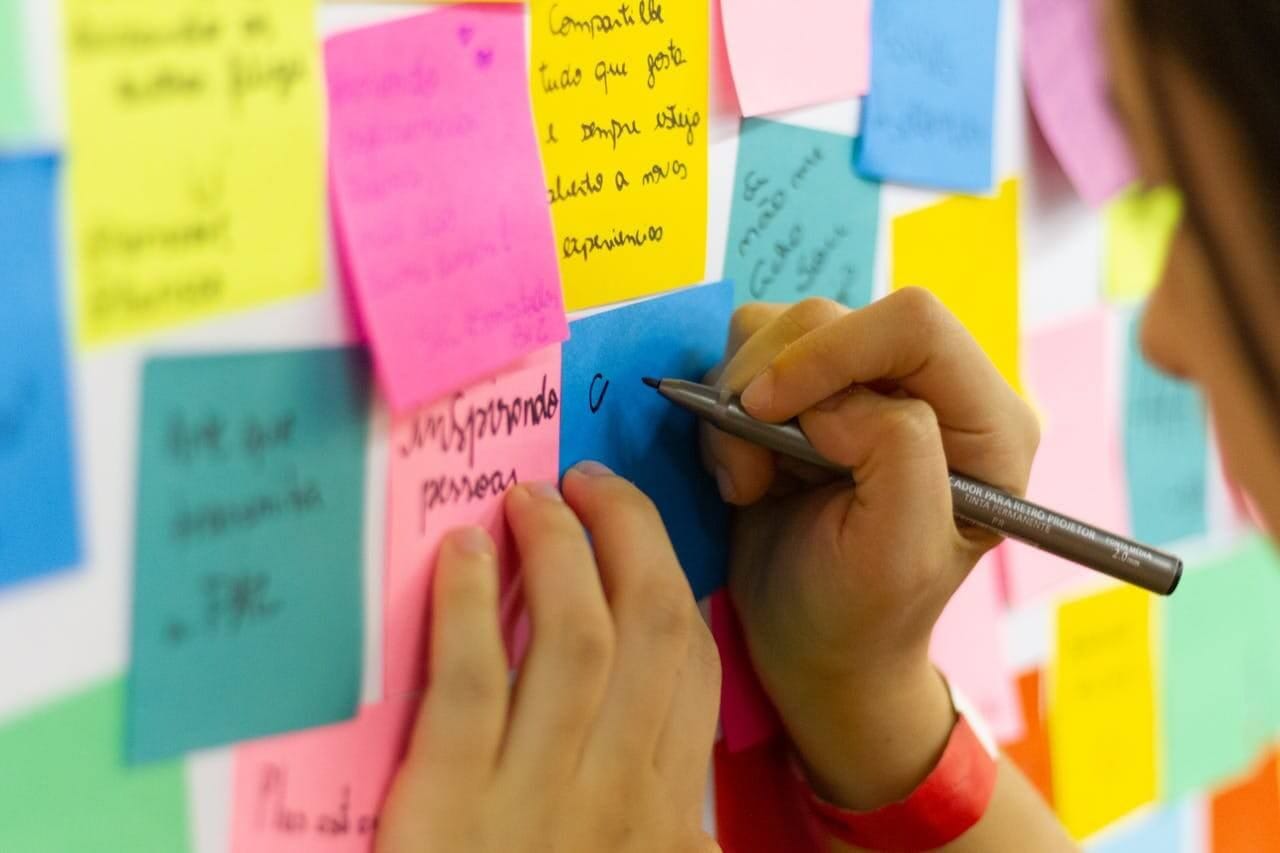What are thesis statements, and why does it matter in academic writing? A thesis statement is a central argument or main idea that guides the reader through the author's perspective on a topic. Many students struggle to formulate and write a clear and concise thesis statement, leading to confusion, frustration, or having to backtrack or even start over their essays.
In this blog, I shed light on the complexities of crafting an effective thesis statement, offering examples and practical tips to demystify this critical aspect of writing.
Sign up on Bold.org to discover scholarship opportunities tailored to your needs and interests!

Brainstorm the Best Topic for Your Essay
When brainstorming for the best topic for your essay, start by considering your interests and passions. If you don't have a specific topic, think about the things that intrigue you or the issues that provoke strong emotions within you. Asking questions like "What excites me?" or "What makes me angry?" can guide you in the right direction.
Additionally, engaging in activities like walking, showering, and playing with pets can spark creative and exciting ideas. Allow your mind to wander freely during these moments of relaxation, as they can be productive grounds for generating unique and compelling essay topics.
How to Write a Good Thesis Statement: Steps & Thesis Statement Examples
Consider the subject matter of your paper carefully from the first paragraph and write at least three diverse subjects related to the main topic being discussed.
If your subject is related to climate change, write a thesis statement by asking: What affects climate change? (Simple!).
Then, try to find something that is close to your experience and connect it to the subject of your paper: What are daily human habits affecting climate change? How does my father contribute to climate change? How do cows contribute to climate change? (by passing gas, you can look it up).
Get Matched to Thousands of Scholarships
Create your Bold.org profile to access thousands of exclusive scholarships, available only on Bold.org.
Create Free ProfileBy framing your subject matter this way with a strong opinion, you allow yourself to delve deeper into its nuances and complexities. Once you have it, you can approach your topic by formulating it as a question requiring exploration and analysis.
So, for example, if you live in a building and take the elevator every day, you already can have the first step towards an exciting argument in a single sentence: "Taking the elevator every day contributes to climate change." Then you can start diving into more detail.

Phrase Your Topic as a Question and Then Answer It
When phrasing your topic as a question, make sure to write it with critical analysis that invites exploration. The thesis statement will inform, explain, and structure the rest of your essay.
For example, if you know your essay wants to explore climate change, society, and human behavior, you could mention, "How do I contribute to the global climate crisis?" This question invites an examination of personal accountability, takes a stand, and might explain the societal implications (For example, taking the elevator).
In crafting your final thesis statement paragraph, you might create a formal argument that already has some kind of answer: "Individual choices, such as reliance on fossil fuels and unsustainable consumption habits, such as taking an elevator, significantly contribute to the escalating climate crisis." This thesis statement encapsulates your position while guiding the direction of the rest of your essay.
By aligning your thesis statement with the initial question (How do I contribute to the global climate crisis?), you establish a coherent framework for your essay and can explore the topic's complexities more deeply and focus on a single topic.
Remember to be creative! This structured approach ensures that your writing remains focused and relevant, allowing you to make bold statements that are interesting and continue raising the stakes throughout your paper, but keep in mind that words matter! Use interesting language and reflect, discuss, and explore different kinds of ways to communicate your ideas.
For example, one of my professors in a Global Warming course in college used to say that taking an elevator releases the size of a closed fist of CO2 into the atmosphere. This kind of comment could effectively address the key issues surrounding climate change in your essay with interesting arguments while being relatable to the reader.
You could start a thesis argument by saying, "If you took an elevator today, you just contributed to releasing carbon dioxide (CO2) the size of a tennis ball."

Why Should Your Essay Contain a Thesis Statement?
Much like a map guides a traveler through unknown territory, a thesis statement directs the writer and the reader along a clear path of exploration within the essay.
It serves as a summary that convinces the reader to continue reading. It functions as a narrative-navigational tool, guaranteeing that your ideas are conveyed effectively and that the reader can easily follow the direction of your argument and sentences.
What to Include in a Thesis Statement (With Example)
Here are some examples of key points that you might want to include as the introduction of your paper and the thesis statement that challenge the nature of an essay:
Clear Position: "Climate change poses a threat to our future."
Supporting Points: "Rising global temperatures, extreme weather events, and melting ice caps are all evidence of this phenomenon."
Scope (Aspects of the topic): "This paper will explore the impacts of climate change and the urgent need for action to mitigate its effects."
Counterargument: "While some may doubt the importance of climate change, scientific evidence overwhelmingly supports the reality of this crisis."
The thesis statement argues the significance of climate change (Clear Position) as a threat to our future. It supports this claim by presenting evidence (Supporting Points).
It also defines the scope of the paper, indicating that it will explore the impacts of climate change and advocate for mitigation efforts (Aspects). Lastly, it acknowledges potential counterarguments while emphasizing scientific consensus on the issue (Counterargument).

How to Write Thesis Statements in 3 Steps
Define Your Position: Plainly state your argument or stance on the topic. (For instance, in climate change, you could say, "Stop taking the elevator if you just take it for convenience").
Provide Supporting Points: Offer evidence or reasons that support your argument (e.g., Taking the elevator releases CO2 into the atmosphere, the health benefits of using stairs, or the amount of yearly CO2 release that can be avoided by using the stairs).
Specify the Scope: Clearly outline what your argument will focus on to define the limits of your discussion. (In the context of renewable energy policies, you can concentrate on habits as alternatives to support renewable energy policies).
Learn more about writing thesis statements now!
How to Generate a Thesis Statement if the Topic is Assigned
When generating a thesis statement for a given topic, start by simply understanding the subject and identifying key themes or issues (do research!).
Next, consider your perspective or interpretation of the topic and brainstorm potential arguments that align with your understanding.
Finally, refine your thesis statement to clearly articulate your position on the topic, guaranteeing that it provides a roadmap for your essay and effectively communicates your main point, argument, or perspective.
For instance, if the assigned topic is "The Impact of Artificial Intelligence on Employment," you might explore arguments such as the potential for AI to take on jobs or the opportunity for AI to create new employment opportunities in new industries.
Finally, complete your thesis statement to make sure that it provides a blueprint for your essay and effectively communicates your main point of argument or perspective.
Wondering about formatting your essay? Check out our blog, What Is MLA Format for an Essay, to learn more!

Develop Your Answer
Once you've formulated a strong argumentative thesis statement, the next step is to revise and expand the content and investigation of your paper. Begin by outlining the main points that support your thesis statement, ensuring each point directly contributes to your argument.
If your thesis statement mentions, "The advancement of artificial intelligence has implications for the future of work," you might develop your essay by discussing specific examples of AI technologies impacting current jobs such as writing. You can analyze potential challenges and opportunities and evaluate the role of possible new regulations in shaping the future of the workforce.
Additionally, complete thorough research to gather evidence, statistics, and expert opinions that support your arguments and provide credibility to your analysis.
Remember: organize your ideas logically, provide clear transitions between paragraphs, and use evidence effectively to support your claims. An excellent way to do this is to connect the last sentence of a section with the beginning of the next paragraph and consistently revise your arguments.
Finally, finish your essay by summarizing a conclusion with key points and reinforcing the significance of your thesis statement in the broader context of the topic. An effective way to do this is to leave the reader wanting more or open the topic to the discussion in the overall answer presented during your paper.
Do you love writing? Check out these writing scholarships to help you save on college costs!

A Strong Thesis Statement Takes Some Sort of Stand
A strong thesis statement asserts a clear position or argument, demonstrating the writer's perspective and opinion. It goes beyond written facts or summarizing. The topic needs to present a debate, a claim that invites discussion and analysis. It can be done in one sentence or expanded over an entire paragraph.
For example, instead of a weak thesis statement stating, "Climate change is happening," decide for a stronger thesis statement such as, "Human activities are the primary drivers of climate change, necessitating urgent action to mitigate its impacts."
By taking a decisive position, the thesis statement sets the tone for the essay. It guides the direction of the argument, prompting critical engagement and debate.
Check out how to end a college essay to learn more about college essays!

Frequently Asked Questions About Thesis Statements
What is a thesis statement, and why does it matter in academic writing?
A thesis statement is a central argument or main idea guiding the reader through the author's perspective on a topic. Preparing an effective thesis statement is crucial as it ensures clarity and coherence in your writing, allowing readers to understand your perspective and the direction of your argument.
Why is formulating a clear and concise thesis statement essential?
Many students struggle to articulate a well-defined thesis statement, leading to confusion and frustration in their writing process. A clear and concise thesis statement is a roadmap for your essay, guiding the writer and the readers to ensure coherence throughout your entire paper.
How can I simplify the process of creating a strong thesis statement?
To simplify crafting a strong thesis statement, begin by brainstorming potential topics that resonate with your interests and passions. Consider questions like "What excites me?" or "What makes me angry?" to guide your topic selection. Activities like walking or playing with pets can also spark creative ideas. Once you've chosen a topic, frame it as a question that prompts critical analysis and exploration.
Explore Bold.org scholarships and the hundreds of articles for students, from navigating the world of financial aid to how to write scholarship essays to win free money.

About Jaeme
Jaeme Velez is an exceptionally dynamic writer, researcher, and avid enthusiast for science and technology. He brings a deep understanding of securing scholarships, obtaining student loans, and navigating the transition from community college to university.
As a first-generation college student, Jaeme began pursuing the dramatic arts and made a significant transition to pursuing academic studies at L.A. Valley College, focusing on Communication and English. He graduated cum laude with a B.A. in Creative Writing at Columbia University in the city of New York. His academic excellence has been recognized through the Casdin Family Scholarship Award and his membership in the Columbia University Honor Society.
Jaeme's academic path is marked by a profound passion for literature and storytelling, particularly in exploring the confluence of diverse cultures and languages while addressing social disparities. Alongside his literary interests, Jaeme maintains a keen curiosity for science and technology, actively engaging in research and projects related to Artificial Intelligence, Design, and human-computer interaction.
Experience
Balancing work and full-time studies as a first-generation college student has endowed Jaeme with a wealth of experience and insights. In his role as a Content Writer at Bold.org, Jaeme shares invaluable wisdom and advice, drawing from his personal journey to provide the guidance he wishes he had received at the start of his academic journey.
His work is fueled by the desire to equip the next generations of students with the knowledge and tools necessary to navigate their unique academic paths. From financial literacy to maintaining a healthy lifestyle, Jaeme strives to contribute to the ongoing discourse on education and support the next generations of scholars, regardless of their age, background, or current stage in life, as they traverse the complexities of higher learning.
Since joining the Bold.org team in 2023, Jaeme has employed his distinctive background as a first-generation student alongside his familiarity with scholarships and student loans to guide students through the intricacies of academic life, emphasizing that every student's journey is distinct and worthy of recognition.
Through his writing and advocacy, Jaeme leverages his personal and professional experiences to provide comprehensive support to students. He is dedicated to empowering students and addressing the challenges they encounter in their pursuit of higher education.
Quote from Jaeme
“Who is the person? What's their problem? Do your research. Offer solutions.”